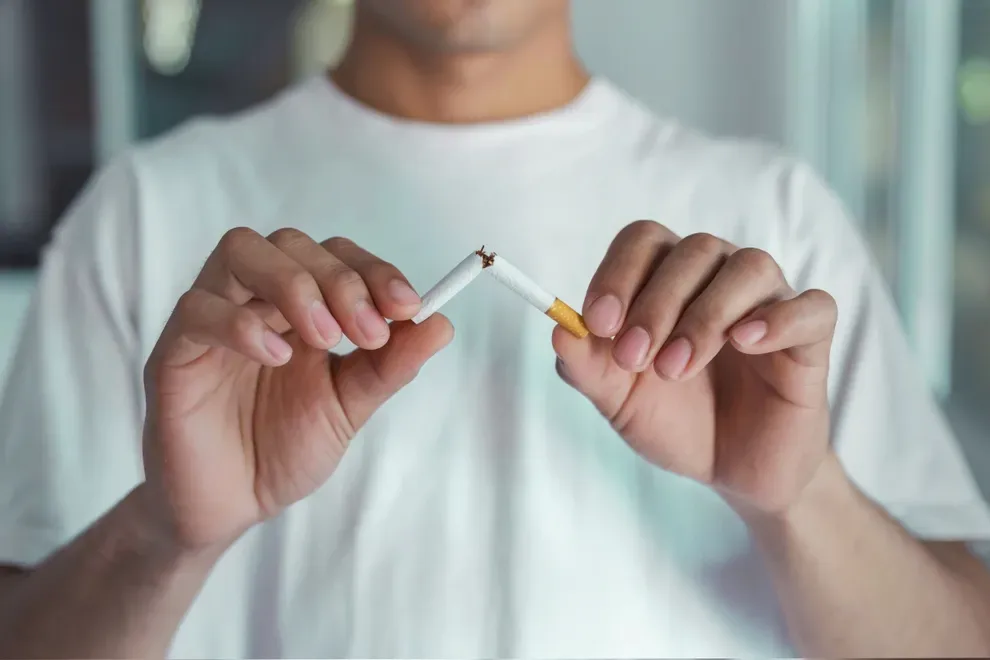Dangers of Smoking After a Tooth Extraction.

Table of Contents
- Procedures
- Extraction Care
- Dangers of Smoking
- Quit Smoking
- References
After you have a tooth extracted, it’s recommended that you avoid smoking for at least a few days.
Smoking during this time can increase pain and inflammation, interact with prescription medications, and disturb sensitive tissues. You can experience intense pain and infection if you smoke after a tooth extraction.
Tooth extraction procedures.
Whether you get your wisdom teeth removed or need another adult tooth removed due to decay or disease, tooth extraction is a common procedure in the United States. Sometimes, your dentist will extract a tooth to reduce crowding, so orthodontic appliances like clear aligners can adjust your teeth more easily.
Tooth extraction is a well-understood surgery. Your dentist can give you a lot of information about how to care for the extraction site after the tooth is removed. It is important to follow your dentist’s instructions to ensure your oral and overall health.
How to care for your mouth after an extraction.
After you have a tooth extracted, you will need to diligently change your gauze for the first several to 24 hours, as recommended by your dentist.
You will need to eat softer foods for a few days; avoid crunchy, hard, sticky, or spicy food. Manage your pain with over-the-counter medicines like ibuprofen or acetaminophen. You can use ice packs to help control swelling in the area.
Monitoring your pain and other symptoms is important. If pain gets worse, bleeding does not stop, or your face feels hot as well as inflamed, go back to your dentist for diagnosis and treatment.
Your dentist will also tell you to avoid certain behaviors, including spitting, using a straw, drinking alcohol, and smoking. Anything that involves suction, like using a straw or smoking, can dislodge the blood clot that forms in the extraction site, which can lead to a condition called dry socket.
Smoking after having a tooth extracted can cause several problems, such as pain, slowed healing time, dry socket, gum infection, and even infection in your jawbone
Smoking after a tooth extraction is dangerous for your long-term health.
There are many other risks involved with smoking after a tooth extraction.
The American Dental Association notes that smoking can directly delay tissue healing after a tooth extraction by slowing the flow of blood to the alveolar nerve. This can increase pain in the area after your tooth is removed.
Other medical experts report that the toxic chemicals in cigarettes will slow down tissue growth, so recovery after surgery takes longer.
The biggest risk from smoking after a tooth extraction is dry socket. Typically, a blood clot forms in the first day after the operation. This clot seals off the tooth root and pulp, beginning to help the gums heal over the wound. This is normal, and it is important that the blood clot is not disturbed.
Suction from straws or smoking can dislodge this clot, which will expose the nerve endings that are under your tooth. This is extremely painful.
This condition is likely to appear between three and five days after surgery. It can last for up to seven days.
But just because you have suffered for seven days does not mean that dry socket will clear up on its own. It can cause other, severe problems like infections, which can dramatically harm the health of your whole body. About 45 percent of people who develop dry socket need to see their dentist multiple times in order to deal with the condition.
People who smoke have a higher risk for developing periodontal or gum disease anyway, and smoking after a tooth extraction increases this risk. This disease destroys the bone surrounding your teeth, which increases the risk of infection in sensitive, exposed tissues.
Gum disease increases the potential need to have teeth extracted. At the same time, smoking after having a tooth removed increases your risk of gum disease, which can lead to another tooth extraction.
People who smoke 10 cigarettes per day are two times more likely to develop gum disease.
If you develop dry socket, you could get an infection in the sensitive tissues that have been exposed. When left untreated, this infection can spread to your jawbone. Bone infections are called osteomyelitis.
When an infection enters a bone, your immune system will attack it with necrophils, a type of white blood cell. If the infection takes hold and is not killed by this process, dead necrophils will accumulate inside the bone and form an abscess, which will fill with pus.
This abscess can block blood supply to the bone. If it becomes chronic, it can cause the bone to die.
Quit smoking and get needed dental treatment to manage your health.
If you do not quit smoking after a tooth is extracted, you are at higher risk for a range of health issues, from ongoing pain and slower healing to bone infection, which could lead to severe jaw damage. You might need months of treatment, including surgery to reconstruct areas that have been infected, remove pockets of infection, and get your mouth healthy again.
In severe cases, dentists may have to devise treatment plans that cover several years to manage oral infections from periodontal disease, which includes extracting more teeth.
The easiest way to avoid this problem is to quit smoking. Cigarettes can damage your oral health in a multitude of ways.
Talk to your doctor about support to help you quit smoking in the long term. If you need to have a tooth extracted and currently smoke, talk to your dentist or doctor about how you can avoid smoking in the week following extraction.
